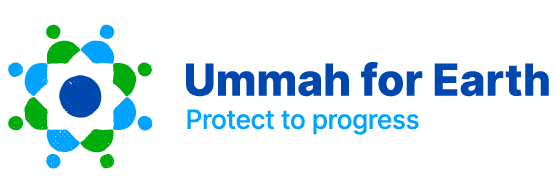A reflection on the Ummah for Earth Alliance’s Global Ethical Stocktake dialogue.
“And the heaven He has raised high, and He has set up the balance.” (Quran 55:7)
With the world getting ready for COP30, there is a new global model that is redefining the way we consider climate action, namely the Global Ethical Stocktake (GES). This initiative, which was launched in the run-up to COP30, includes an appeal to humanity to go beyond figures and emissions targets and ask the more profound question: why are we still pursuing the practices that we know are harming our communities?
The GES, which was launched by the Brazilian President Luiz Inácio Lula da Silva and UN Secretary-General António Guterres, is an invitation to a moral spiritual reckoning, unlike the traditional climate evaluations, which gauge progress based on numerical data. It challenges religious communities, Indigenous people, youth, and civil society to consider the values, systems, and behaviors that need to transform to achieve actual change.
In response to this call, the Ummah for Earth Alliance organized a bilingual (Arabic-English) discussion in September 2025 to integrate an Islamic ethical dimension into the discussion. The discussion question was: What are the moral shortcomings on the way to climate action? How can we be guided by Islamic paradigms, based on Al-Mizan (divine harmony) and Tayyib (pure benefit)?
This reflection focused on Islamic finance. Even though it operates on the principles of fairness, balance, and environmental stewardship, a good part of it continues to fund the very systems that cause environmental degradation, all over the world. This paradox shows why we have an urgent need to rebrand our financial systems back to the moral intent that Islamic finance is truly a Tayyib economy, an economy that cures and creates balance.
Our dialogue identified three barriers keeping Islamic finance trapped:
- First, the adoption of growth theology—; the belief that success means endless expansion rather than balance. Islamic banks measure quarterly returns while knowing this violates Al-Mizan itself.
- Second, colonial financial control; Muslim nations cannot protect their people because they’re shackled by illegitimate debts. Pakistan pays $10 billion annually to creditors while 33 million face floods. Every Islamic bank depends on Western correspondent banks that can terminate relationships instantly. This isn’t independence. It’s capture.
- Third, knowledge fragmentation; where scholars, financiers, and activists speak different languages. Each knows half the truth but never pieces it together. Most Muslims don’t even know that zakat can fund climate action—a misconception that keeps billions paralyzed.
In essence, finance must embody the principle of Tayyib that which is pure, wholesome, and beneficial. It is not enough for finance to be merely Halal (permissible). It has to be Tahayyib: curing, medicine, and life-giving. An investment that is Haram because it harms or destroys the planet is Haram in its effects. The green sukuk in Malaysia, the renewable programs in Indonesia, and the debt-free solar projects in Jordan make it possible. It is time to introduce a new financial standard: Tayyib.
COP30 Belém is not any other climate conference. It is an ethical test to mankind, to the Ummah.
Can Islamic finance be the theology of infinite expansion? Will it ascend to re-emerge Al-Mizan, the divine balance which we were commissioned to safeguard?
The Dialogue’s action points:
- Recognize Islamic finance as an essential partner in global climate governance, not an add-on
- Cancel colonial debts that force nations to choose between creditors and climate protection
- Adopt Tayyib standards for beneficial finance, not merely “less harmful” exclusions
- Remove barriers preventing Islamic environmental finance from flowing freely
- Create the “Single Table”—bringing together scholars, financiers, and youth to restore integration
- Support alternative financial architecture based on real value, not debt-based money
- Mandate just transitions using Islamic frameworks that protect vulnerable communities
Al-Mizan is not a verse, but a covenant. The harmony of the sky, the fairness of business, the beat of life. Whether we can restore it is not the question. Whether we will or not is the question. Since the cure is already there, it is in our faith, in our hearts, and in the Ummah, the moral economy of Islam needs to be woken up. It’s time to restore Al-Mizan.
